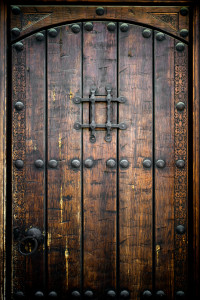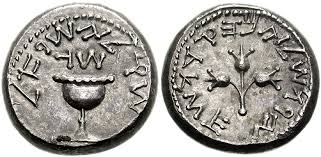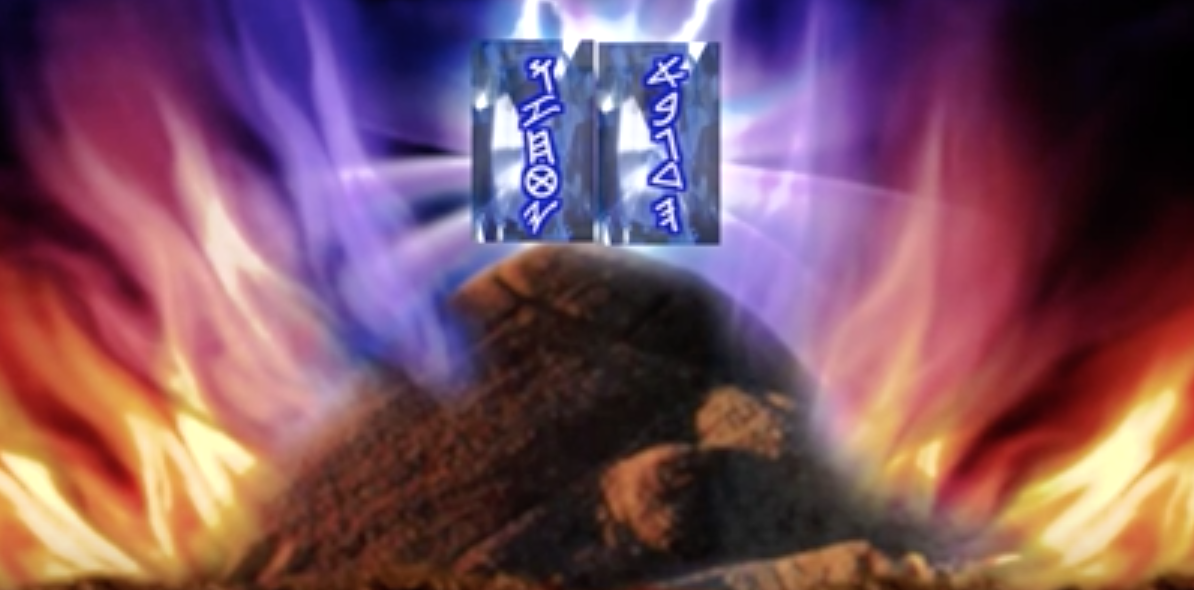מִּשְׁפָּטִים
Parshah Mishpatim
Shemoth (Exodus) 21:1-24:18
“These are the right-rulings which you are to set before them”–Shemoth (Exodus) 21:1
This portion opens וְאֵלֶּה הַמִּשְׁפָּטִים “w’eleh ha’mishpatim” which translates and these are the judgments אֲשֶׁר תָּשִׂים לִפְנֵיהֶֽם “asher tashim l’pnechem”, which you are to set before their faces. By saying “and these” YaHuWaH is including the following mishpatim or Judgments to the ten words also known as the “ten commandments”. In the previous Torah Portion we read how YaHuWaH declared his ten words from the top of Sinai, but now we are to understand that these judgments are a continuation of the revelation given at Sinai. The word מִּשְׁפָּטִים mishpatim translates “rules” or sometimes “ordinances” and is an extension of the Hebrew (Abryt/Ivrit) word שְׁפָּט shaphat meaning literally “judge”. Parashat Mishpatim is referred to as Sefer HaBrit or “the Book of the Covenant”, since it contains 53 of the 613 mitzwot , or “commandments” found in the entire Torah. Of course this count is given to us from rabbinic literature, depending on how one may count the commands there may be slightly more or less. These specific mishpatim include diverse civil, criminal, ceremonial, economic, and family laws. Being that this is a supplementary and complimentary guide to studying Torah, all the judgments will not be listed here, only a general summary. Roughly twelve percent of Torah law is found in this one section. These mishpatim or judgments give us direct insight into the Malchut (kingdom or Reign) of YaHuWaH which is, was and is to come.
Servants
The first of these judgments would forever alter the history of humankind and improve the ethics and respect man would show to his fellow man. YaHuWaH begins with how we are to treat those who are our servants. The Torah teaches that slavery is not a sin parse but there are “heavenly” rules for how we are to treat those who are in subjugation to us. The Torah does not allow abuse and murder of those who deemed to be an obed or servant. This indeed was a radical idea for the day and age of the ancient Yashar’alites (Israelites). If a Yashar’alite (Israelite) master would buy a male Yashar’alite (Israelite) slave, because perhaps he was sold as retribution for a theft or some other reason. He could only be held for six years. In the seventh year he is released which is a picture of the redeeming qualities of the shabbath. By definition this is not slavery but a system of indentured servitude. If the servant has a wife before he becomes his master’s property then he of course keeps his wife and she is freed when he is. However if his master gives the servant a wife, the wife and children remain property of the master. If the servant desires to keep his wife he must make a solemn oath before the bet din (house of judgment) and have his ear pierced with an awl to the door of the master’s house to indicate that he is now part of the master’s clan.
The indenture of a Hebrew servant girl carries many limitations. This specific section of Torah deals with a young girl who has been sold by her Father. It should be noted that children were not sold to be slaves or used in any vile manner but to be given a better life. Often times poor Fathers may sell their daughter to a wealthy family so that she could have a better life and be a prospect to marry into the master’s wealthy family. She can only be kept in service until she is mature, which historically was in her “teens”. If she was a prospect for marriage into the master’s family she could be freed earlier and given the status of a “daughter” until the marriage. In this portion the Torah also makes mention of three basic duties of a husband towards his wife: namely food, clothing, and conjugal rights. If a man takes a second wife he cannot diminish from her three rights whatsoever. If a man cannot provide her basic rights she is to be set free without cost. The servant girl, or her family, also have the option of “redeeming” her by paying her master the price owed for her remaining servitude. This is radically different from what people did long ago and even today in some lands where women are property to be used and abused. The Torah says she is to be given the opportunity to be married into the family or she can actually buy her own freedom. The Torah protects her against being defiled or abused in any way shape or form contrary to modern concepts of slavery.
There are no laws against how long a foreign slave may be indentured to his master. However a series of laws which protect him or her and govern how they must be treated.
For instance if a master hits his slave and he dies the same day the master must be put to death. This also is contrary to the ancient world, where the life of a slave could never be worth the life of a master. If a master injures his servants eye or tooth, the servant must be released and given full freedom. This applies to both native and foreign servants.
Criminal violence
YaHuWaH goes on to condemn premeditated murder and that anyone who commits murder by plotting and planning is to be put to death. However YaHuWaH in his infinite wisdom also says that if a man accidentally kills his neighbor and never intended to hurt him should run to a place of safety until the court has ruled on the matter. Whoever kidnaps someone to sell into slavery, if he is caught must be put to death. Anyone who curses his or her Father or Mother must be likewise put to death. If two men are fighting and one hits the other with a stone or fist and is confined to his bed, if he eventually can walk about outside with a staff the man who smote him is innocent. However the one who injured him is liable to pay all expenses of the man’s lost time and must see to it that he is completely healed. If men are fighting and a pregnant woman somehow gets injured in the midst of the men, then only if the child is born without injury is the man who accidentally struck her innocent. If the baby has defects then the Torah states that the penalty is life for life, eye for eye, tooth for tooth, hand for hand, foot for foot, burn for burn, wound for wound and lash for lash. The ancient Kohanim (Priests) of the line of Zaddok interpreted this literally while later the Pharisees claimed this only meant financial restitution.
Laws of Damages
A person is liable for damages that are inflicted by his personal property.
“If an ox gores a man or a woman, so that they die, the ox shall be surely stoned, and its flesh shall not be eaten; but the owner of the ox shall be acquitted.”
“But if the ox was wont to gore from yesterday and the day before, and his owner had been warned, yet he had not kept him in, and it killed a man or a woman,” the owner will either be put to death unless a “ransom” to the heirs of the victim is ruled.
If an ox gores another ox to death, the owner of the goring ox pays half the value of the killed animal. If the goring ox has a history of past offenses, full damage is paid.
“If a man shall dig a pit… and not cover it, and an ox or a donkey falls into it — the owner of the pit shall pay; he shall return money to its owner….”
“If a man shall cause a field or vineyard to be eaten, having allowed his beast to go forth and feed in another man’s field — of the best of his field, and of the best of his vineyard, shall he make restitution.”
“If fire breaks out, and catches in thorns, so that the sheaves, or the standing corn, or the field, be consumed — he that kindled the fire shall surely make restitution.”
The Torah Portion also discusses four types of circumstances that may make a person responsible for the care of another’s property, and outlines covers and the extent and penalties for each type of “guardian.”
Social Laws
A man who seduces a young, girl who is unmarried must pay a dowry or bride price and marry her. Her father does not have to obligate to allowing the marriage. In this case the man must pay the dowry price set by her Father as a fine.
“You shall neither vex a stranger nor oppress him, for you were strangers in the land of Mitsrayim.”
“You shall not afflict any widow or fatherless child. If you at all afflict them, and they cry to Me, I will surely hear their cry; and My anger shall be inflamed…”
All firstborn sons must be dedicated to YaHuWaH. A newborn animal must remain with its mother for at least the first seven days of its life before it is fit to be offered as a sacrifice.
Meat that is tereifah or “torn” in the field by a predator -may not be eaten, but must be “thrown to the dogs.”
The names of pagan deities are not to be heard spoken from our mouths.
Financial laws
“When you lend money to My people, to the poor person [who is] with you, you shall not behave toward him as a creditor; you shall not impose interest upon him.”
Interest can be imposed upon the Goyim (Nations or Gentiles) according to Torah, but not the Native born.
“If you at all take your fellow’s garment as a pledge [for a loan], you shall deliver it to him by sundown. For that is his only covering, it is his garment for his skin: in what shall he sleep? It shall come to pass, when he cries to me, that I will hear, for I am compassionate.”
Legal Practices
It is forbidden to despise a judge, or to curse “a ruler of your people.”
“Distance yourself from falsehood.” Do not accept false testimony, help a false witness, accept a bribe or in any way unfairly influence the outcome of a trial.
Follow the testimony of two or three. However “do not follow a majority to do evil.”
If the court has acquitted a person it is against the law to kill them even if the court was unable to convict them no matter how sure you are they guilty. YaHuWaH tells us, ” I shall not exonerate the guilty” and “vengeance is mine.”
Preventing Partiality
“If you meet your enemy’s ox or his donkey going astray, you shall surely bring it back to him again.”
“If you see the donkey of your enemy collapsing under its burden, and are inclined to desist from helping him, you shall surely help along with him.”
Torah warns:
“You shall not oppress a stranger; for you know the feelings of a stranger, since you were strangers in the land of Mitsrayim.”
Capital Offenses
Premeditated murder, cursing one’s parents, kidnapping, practicing witchcraft, engaging in bestiality and offering sacrifices to idols are all punishable by death!
The Sabbatical Year and the Three Pilgrimages
“Six years you shall sow your land, and shall gather in its fruits; but the seventh you shall let it rest and lie fallow, so that the poor of your people may eat, and what they leave, the beasts of the field shall eat…”
“Six days you shall do your work, and on the seventh day you shall rest; that your ox and your donkey may rest, and the son of your handmaid and the stranger may be refreshed…”
“Three times a year you shall celebrate a festival to Me”
“You shall keep the festival of Matzoth for seven days you shall eat unleavened bread as I have commanded you, at the appointed time of the month of springtime, for then you left Mitsrayim…”
“And the Festival of Harvest (Shabuot], the first fruits of your labors, which you have sown in the field.”
“And the Festival of ingathering [Sukkot], which is at the end of the year, when you have gathered in your labors out of the field.”
“[These] three times in the year, all your males shall appear before YaHuWaH your Aluahym.”
The Promise of the Land
“Behold, I send my Malak before you, to guard you on the way, and to bring you to the place which I have prepared… to the [land of] the Emorites, and the Hittites, and the Perizzites, and the Canaanites, and the Hivites, and the Yebusites; and I will destroy them…”
“I will not drive them out from before you in one year, lest the land become desolate, and the wild beasts multiply against you. Little by little will I drive them out from before you, until you increase and inherit the land.”
“I will set your boundaries from the Red Sea to the Sea of the Philistines, and from the desert to the river… You shall make no covenant with them, or with their mighty ones. They shall not dwell in your land, lest they make you sin against Me; for if you serve their mighty ones, it will surely be a snare to you.”
Malak YaHuWaH
After giving these various mitzwot, YaHuWaH assured Mushah (Moses/Mosheh) that His Messenger (Malakh YaHuWaH) would guard and protect Yashar’al (Israel) until they arrived in the land of Canaan, if they obey his voice. Of course this is translated often as “angel” in scripture, but angel is a roman concept often depicted as a woman with a sun disk halo. This Messenger is the “Ish Milcama” or “Man of War” spoken of in the Song of the Sea. YaHuWaH stated in the Torah that he had put his Name in this Malak. He is called Malak YaHuWaH throughout the scriptures, and it was the Malak who led the children of Yashar’al into the Promised Land. It was this Malak who led the victories over the inhabitants of the land. This Malak or Messenger is non other than Yahuwshuwa Ha Mashyach in his pre-existing form!
Mushah mediated all mishpatim or judgments to the people, and the people responded as one, kol hadevarim asher diber YaHuWaH na’eseh: “all the words which YaHuWaH has said we will do.” Then he wrote the words of the covenant ,sefer habrit, and built an altar at the foot of Mount Sinai with twelve pillars and sacrificed YaHuWaH. Then he took the blood from the offerings, and sprinkled the altar, and read the “brith” or covenant to the people. The people responded yet again kol asher diber YaHuWaB na’aseh w’nishma “all that YaHuWaH says we will do and obey. Mushah took the rest of the sacrificial blood and sprinkled it on the people saying, “Behold the blood of the covenant that YaHuWaH has made with you in accordance with all these words.”
After this event Mushah, Aharon with his sons Nadab and Abihu, along with seventy of the elders ascended Mount Sinai to eat a “covenant meal” as an agreement to the covenant in the presence of YaHuWaH. The text states that at the meal they saw Elohei Yisrael (the Elohim of Israel). Under his feat there was a paved work of sapphire stone. The elders saw Aluahym (Elohim) but he did not stretch out his hand to them.
YaHuWaH spake to Mushah to come back up to the mountain to receive לֻחֹת הָאֶבֶן luchot ha’eben ,the tablets of stone inscribed with the Asar Dibrim or Ten Words. Due to the fact that the sapphire stone is mentioned to be beneath YaHuWaH’s feet and for other reasons, historically we know that the Ten Words were not written on gray tombstones with roman numerals but rather written in Hebrew on tablets of Sapphire.
24:12 וַיֹּאמֶר יְהוָה אֶל־מֹשֶׁה עֲלֵה אֵלַי הָהָרָה וֶהְיֵה־שָׁם וְאֶתְּנָה לְךָ אֶת־לֻחֹת הָאֶבֶן וְהַתֹּורָה וְהַמִּצְוָה אֲשֶׁר כָּתַבְתִּי לְהֹורֹתָֽם׃
And YaHuWaH said to Mosheh, “Come up to Me on the mountain and be there, while I give you tablets of stone, and the Torah and the command which I have written, to teach them.”
YaHuWaH called to Mushah to come back up the mountain. The text states that not only did YaHuWaH write the Asar Dibrim (ten words) on tablets of stone but he also wrote the Torah and commands. This time only Yahuwshuwa ben Nun followed him up the mountain although he remained down below. Again Mushah climbed the mountain, while it was still covered by a shining cloud of fire. The seventh day, he heard the Voice of YaHuWaH calling to him from the midst of the cloud of kabod (esteem often called “glory”), and he entered into the Presence of YaHuWaH. There he remained on the mountain for forty days and forty nights.
This Torah portion teaches us many things about our Creator. We know that he is fair and impartial. We also know that his words govern our life. YaHuWaH is often described as the invisible one though many have seen him as we read in this portion. We are not to make an image of stone for him but rather allow his image to be seen through the living words of his covenant. Truly Yahuwshuwa the Messiah of Yisrael is the Malak, and the word of YaHuWaH and this study gives us insight not just into his heart but into his Malchut (reign). These mishpatim (Judgments) are the constitution for the Reign of YaHuWaH.








